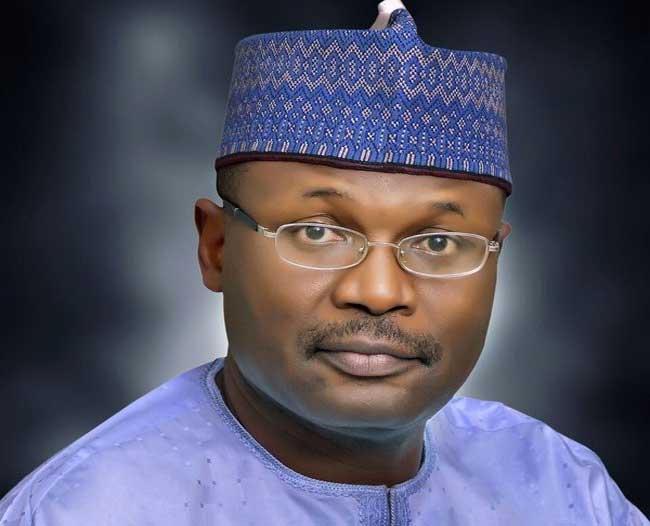Breaking News
JUST IN: Call your supporters to order, INEC charges parties in Bayelsa, Imo, Kogi
Sani noted that as Nigeria approached the off-season elections in Imo, Bayelsa and Kogi states in November, all hands must be on deck to ensure resident electoral commissioners and returning officers were not pressured by some governors and INEC itself to falsify results in their states.

Ahead of the November 11 governorship elections in Bayelsa, Imo and Kogi states, the Independent National Electoral Commission, INEC, has expressed grave concern over the increasing cases of pre-election violence by political parties, urging them to call their supporters to order.
INEC Chairman, Prof. Mahmood Yakubu, who gave the charge at the commission’s election quarterly review meeting with political parties in Abuja yesterday, said: “As we review the general election, we also need to focus our attention on the forthcoming by-elections and the three off-cycle governorship elections in Bayelsa, Imo and Kogi states.
”For the commission, we are looking at some of the lessons learnt from the general elections to improve our performance in the forthcoming elections.
“We are focusing, among other issues, on election technology, recruitment and training of ad hoc staff, the conduct of some of our regular and ad hoc officials, security issue, logistics in particular and our relationship with other service providers in general.
”I also appeal to party leaders for similar introspection on the conduct of your candidates and their supporters.
”The use of thugs during elections to harass election officials, intimidate voters and disrupt processes, sometimes resulting in the destruction of election materials or even worse must be addressed.
”Campaign in public by parties and candidates in the three states commenced on July 14, 2023 as provided in the timetable and schedule of activities for the governorship elections. ”Sadly, there are already disturbing reports of clashes between opposing parties with claims and counter claims of innocence or culpability. These claims help no one. Call your supporters to order.
“At the same time, I must also acknowledge the perennial complaints from some political parties that the power of incumbency is used in some states to restrain some parties and candidates from access to public facilities for media campaigns and outdoor advertising through exorbitant fees or outright denial.
”This often leads to the mutual destruction of advertising materials such as billboards, resulting in altercation and violence involving supporters of opposing political parties.”
In its remark, the Inter-Party Advisory Council, IPAC, advised the Presidential Election Petition Tribunal, PEPT, not to be swayed by emotions or technicalities but base its judgment on well-reasoned interpretation of the law.
IPAC Chairman, Engr. Yabagi Yusuf Sani, who gave the charge at the meeting. recalled how IPAC had on February 28 at the National Collation Centre in Abuja, rose to the occasion and encouraged INEC to continue and conclude the process of collation of results for the presidential election to guarantee the survival of democracy in Nigeria.
He said the position taken by IPAC was, however, without prejudice to some of its member-political parties who had since approached the courts for redress.
“Two major opposition parties, the PDP and the Labour Party, as well as three other political parties, disagreed with the outcome of the elections and have since gone to the Presidential Elections Petitions Court to challenge the outcome of the election; in consonance with the norms and values of the electoral process.
”We commend them for following the path of law. However, we really hope that the decision of the court will not be based on some perverse public policy rationale or technicalities, but, rather, on reasoned and reasonable interpretation of substantive and procedural law. What Nigeria needs now is fairness, equity and justice.”
Sani also recalled that as the tribunal’s decision was being awaited, the European Union Election Observer Mission (EU/EOM) to the 2023 general election in Nigeria had on June 27 presented its report to the public.
He said the full report, which was already in the public domain, had understandably become the subject of intense public interest.
“IPAC carried out a dispassionate review of the EU/EOM report as well as listened to the views expressed by all stakeholders in the Nigerian democratic process and has since referred them to the IPAC 2023 Elections Review Committee set up to unearth all immediate and remote causes surrounding the conduct and the outcome of the election.
“The findings and recommendations of the IPAC 2023 Review Committee will assist in engendering dialogue among all stakeholders on electoral, legal and administrative reforms necessary to achieve improved democratic practices in Nigeria,” he said.
Sani noted that as Nigeria approached the off-season elections in Imo, Bayelsa and Kogi states in November, all hands must be on deck to ensure resident electoral commissioners and returning officers were not pressured by some governors and INEC itself to falsify results in their states.
According to him, the Adamawa State 2023 governorship election result declaration saga and the embarrassment caused INEC and the nation at large is a case in point.
He said the prosecution of the Adamawa REC in court by INEC was highly desirable and commendable.
Sani added: “Equally desirable is action by all relevant security agencies to check the misuse of state resources in violation of Section 92(2) of the Electoral Act 2022 which prohibits ‘the use of state apparatus to the advantage or disadvantage of any political party or candidate’.
“IPAC understands that there are so many other factors that affected the conduct of the 2023 election, such as obvious ethnic profiling, religious sentiments, voters’ suppression, ballot snatching, hate speech, etc, which are beyond the commission, hence the need for all the key stakeholders to work in harmony.
“With the INEC 2023 elections review report, stakeholders are now presented unique opportunity to work together with a view to improve the electoral process for future elections beginning with the three off-season elections in November in Kogi, Bayelsa and Imo states.”




















